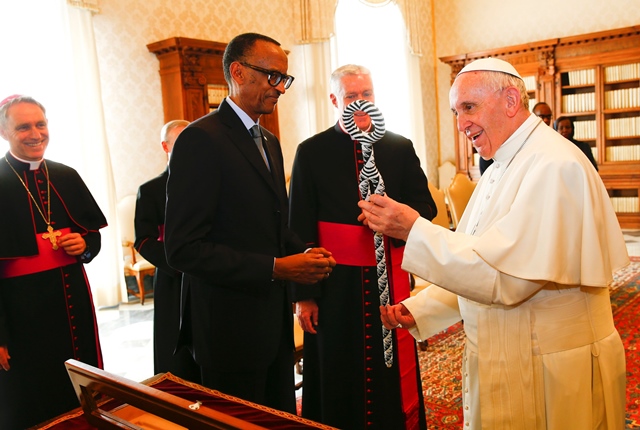
The pontiff "conveyed his profound sadness, and that of the Holy See and of the Church, for the genocide against the Tutsi," the Vatican said in a statement after a meeting between Francis and the Rwanda President Paul Kagame.
"He implored anew God's forgiveness for the sins and failings of the Church and its members, among whom priests and religious men and women who succumbed to hatred and violence, betraying their own evangelical mission," it said.
Francis's pardon plea followed a request from Rwanda in November for the church to apologise for its role in the massacres.
Six times Pope Francis made sweeping statements
Since the genocide, whose victims were mostly from the Tutsi minority, the Catholic Church has been accused of being close to the Hutu extremist regime in power in 1994.
A number of churches became scenes of mass killings as Hutu militiamen found people seeking refuge in them, sometimes turned over by priests, with no way out.
Francis, 80, said he hoped "this humble recognition of the failings of that period, which, unfortunately, disfigured the face of the Church, may contribute to a 'purification of memory'" and promote "renewed trust".
Several Catholic priests as well as nuns and brothers were charged with participating in the genocide and tried by the International Criminal Tribunal for Rwanda (ICTR) and by a Belgian court, leading to some convictions while others were acquitted.
The highest-ranking Church official to be tried for genocide was the late bishop Augustin Misago, who was acquitted and freed from prison in June 2000.
During the 20th anniversary commemorations in April 2014, Kagame accused the Catholic Church of having "participated fully" in establishing the colonial ideology that created the divide between Hutus and Tutsis, which he claimed led to the genocide.
Pope Francis says may consider making married men priests
In November, a letter of apology signed by the bishops representing the nine dioceses in Rwanda was read in all churches.
But the Rwandan government said the local apology was not sufficient considering the crimes committed.
Jean-Pierre Dusingizemungu, head of the Ibuka survivors group, called the pope's words a "giant step taken by the church" that would "help us fight the negationism and ideology of genocide".
Rwanda Foreign Minister Louise Mushikiwabo, who accompanied Kagame to the Vatican, said Monday's meeting was held in "a spirit of openness and mutual respect".
The Catholic Church is "facilitating" efforts to help survivors and repentant perpetrators live and work side by side, she said.
But the minister said that there were those in the church who were still protecting genocide perpetrators.
"Today, genocide denial and trivialisation continue to flourish in certain groups within the Church and genocide suspects have been shielded from justice within Catholic institutions," she said.
About half of Rwandans are Catholic, but since the genocide many have turned to pentecostal churches.
"The pope's gesture is a way for him to put back into play a Rwandan Catholic Church effectively discredited" by the scandal, wrote Nicolas Seneze, the Rome correspondent for the French daily La Croix.










1732354127-0/Untitled-design-(3)1732354127-0-270x192.webp)






COMMENTS (1)
Comments are moderated and generally will be posted if they are on-topic and not abusive.
For more information, please see our Comments FAQ